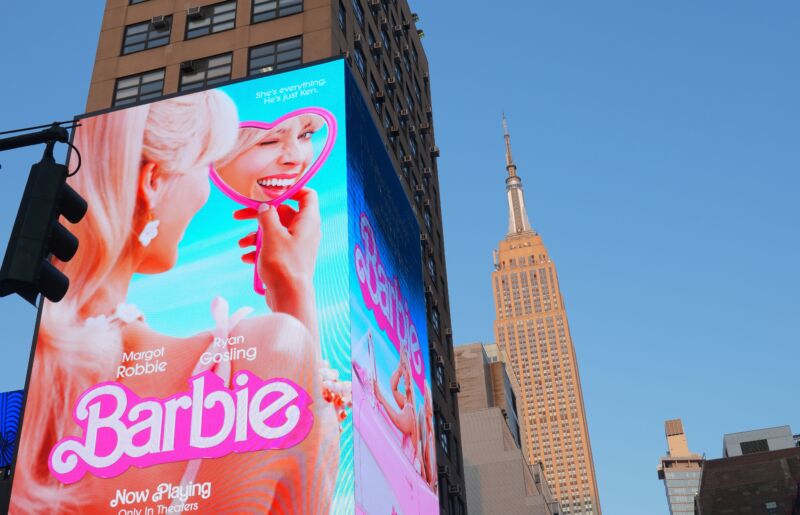Do you need a gynecologist? —
The movie apparently sparked some questions.

Enlarge / A digital advertisement board displaying a Barbie movie poster is seen in New York on July 24, 2023.
This post contains spoilers—for the movie and women's health care.
There's nothing like stirrups and a speculum to welcome one to womanhood, but for some, the recent Barbie movie apparently offered its own kind of eye-opening introduction.
The smash-hit film ends with the titular character making the brave decision to exit Barbieland and enter the real world as a bona fide woman. The film's final scene follows her as she fully unfurls her new reality, attending her first woman's health appointment. "I’m here to see my gynecologist," she enthusiastically states to a medical receptionist. For many, the line prompted a wry chuckle, given her unsuspecting eagerness and enigmatic anatomy. But for others, it apparently raised some fundamental questions.
Online searches in the US for "gynecologist"—or alternate spellings, such as "gynaecologist"—rose an estimated 51 percent over baseline in the week following Barbie's July 21, 2023 release, according to a study published Thursday in JAMA Network Open. Moreover, searches related to the definition of gynecology spiked 154 percent. Those search terms included "gynecologist meaning," "what is a gynecologist," "what does a gynecologist do," "why see a gynecologist," and the weightiest of questions: "do I need a gynecologist."
The “Barbie effect”
The study's authors, led by researchers at Harvard Medical School, assessed 34 query terms that fit into six categories of searches, including "gynecologist," "gynecologist definition," "gynecologist appointment," "doctors," "doctor's appointment," and "women's health." The last three served as controls for more general interest in medical information. As the authors put it, the three control searches helped establish "whether unobserved contemporaneous factors influencing health-seeking behavior more generally may have contributed to gynecologic-related search volume."
While the researchers noted clear spikes in "gynecologist" and "gynecologist definition" searches, they saw no changes in search trends for the three control search categories during the week after the movie's release: "doctors," "doctor's appointment," and "women's health." This suggested that the increase in gynecology-related searches may, in fact, be linked to the movie rather than some increased interest in health care generally.
The researchers also did not see a corresponding increase in searches related to gynecology appointments, suggesting that the transient online interest in gynecology didn't translate to online searches for actual gynecological care, with queries such as "gynecologist near me." The researchers speculate that two factors might explain this. For one, there's the possibility that the data couldn't capture care-seeking decisions. It may be that there's a longer, variable time gap between newfound awareness of gynecology and the decision to seek care. The second possibility is that the people searching for basic information about gynecology may not need gynecological care themselves.
Overall, the authors conclude that "Barbie’s closing line may have spurred interest in gynecology." The finding is supported by earlier work that also suggests popular culture can have measurable influences on health literacy and awareness among the general public, the authors conclude. For instance, when journalist Katie Couric live streamed her colonoscopy, there was a transient 21 percent increase in colonoscopies, and when actress Angelina Jolie penned an editorial about her experience with breast cancer, there was a transient 64 percent increase in genetic testing for breast cancer risk (BRCA testing). But while the "Barbie effect" seems to have raised some awareness of gynecology, it remains unclear if it will lead to a measurable improvement in health outcomes.